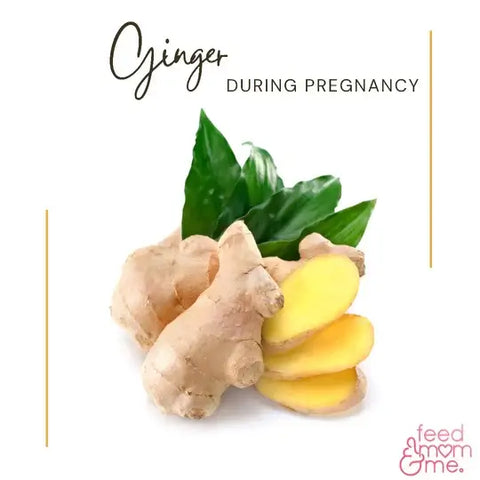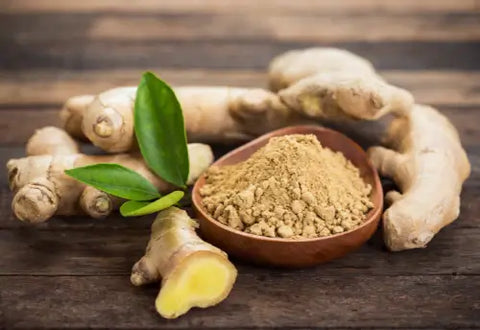The Benefits Of Ginger During Pregnancy
Published:Updated:

Medically Reviewed by Dr. Nicole Palmer, DO
In This Article:
★ WHAT IS GINGER?
★ IS IT SAFE TO EAT GINGER DURING PREGNANCY?
★ HEALTH BENEFITS OF EATING GINGER RAW DURING PREGNANCY
★ HOW MUCH GINGER SHOULD I TAKE DAILY?
★ SHOULD YOU TAKE A PRENATAL VITAMIN WITH GINGER?
★ ARE THERE ANY SIDE EFFECTS OF GINGER IN PREGNANCY?
★ CAN GINGER AFFECT PREGNANCY HORMONES?
★ WAYS TO INCLUDE GINGER IN PREGNANCY
★ HOW TO GROW GINGER?
★ BEST PRENATAL VITAMIN WITH GINGER
Ginger has been used as a therapeutic and herbal remedy for centuries. You can add ginger root to your food for a zesty flavor and many health benefits. For pregnant women, this herb helps with morning sickness, nausea, and much more! Here are the health properties of ginger during pregnancy.
★ WHAT IS GINGER?
Ginger, also known as zingibar officinale, is a flowering plant that is considered a herb. The root of this plant is the part that has been taken for herbal remedies and eaten as a spice for food. Ginger root extract benefits vary from morning sickness, all the way to lowering cholesterol levels. The ginger plant is widely available for consumption as in a variety of beverages, lozenges, and even candies!
Before consuming ginger while pregnant, we advise consulting with your OB and knowing the safe dosage for you and your developing baby.
★ IS IT SAFE TO EAT GINGER DURING PREGNANCY?
Yes, it is safe to consume fresh ginger root while pregnant. However, dried ginger root should not be consumed during pregnancy, due to higher concentrations levels of two active compounds Shogaol and Gingerol. Which are about three times more than in fresh ginger. It is recommended that you consume raw ginger in moderation.
Ginger is a well-known superfood with many medicinal properties. Ginger properties are beneficial as long as you consume it in moderation, by taking a prenatal vitamin with it or adding it to a recipe. Before taking any ginger supplements, we recommend consulting with your healthcare provider.

★ HEALTH BENEFITS OF GINGER DURING PREGNANCY
Ginger may not provide many vitamins or minerals, but it's full of antioxidants that help protect you and your developing baby. Eating raw ginger or ginger extract is known to help with nausea, morning sickness, digestion, boost your immune system, and much more. Here are some of the benefits a piece of ginger helps with.
Helps relieve morning sickness and nausea: Morning sickness affects 80% of women during their first trimester and can range from mild nausea to vomiting. There are many chemicals found in ginger like gingerols, shogaols, zingiberol, sesquiphellandrene, bisapolene, that have scientifically been linked to aiding in reducing morning sickness and nausea.
Helps with Digestion and bloating: For many centuries, ginger has been known as a common natural treatment for stomach issues, such as indigestion and constipation. Which is a common pregnancy discomfort for many. Studies suggest ginger can help stimulate the movement of food through your digestive system, improving indigestion, constipation, and decreasing bloating.
Helps you fight cough and cold: While pregnant, your immune system weakens, making you more susceptible to getting sick. Ginger is filled with antioxidants and antimicrobial properties, which help boost your immune system and recover faster.
Helps promote healthy fetal development: You see, ginger contains a powerhouse of antioxidants and other essential nutrients that help nourish the growing fetus within you. While scientific studies on ginger's direct effect on fetal development are limited, we do know that a well-rounded diet rich in antioxidants is crucial to support prenatal health. Some studies have hinted that consuming around one gram of fresh ginger per day could potentially play a role in aiding fetal development.
Helps with inflammation: Ginger’s chemicals, gingerols, and shogaols, are known to be anti-inflammatory. While some inflammation during pregnancy is natural and healthy, excessive inflammation can lead to negative outcomes for your baby.
Helps keep your blood sugar levels normal: In the United States, 2-10% of pregnant women are affected by gestational diabetes. There are various studies on how ginger reduces gestational diabetes by keeping blood sugar at normal levels, in addition to moderating carbohydrate intake.
Helps with blood circulation and lowers cholesterol: Ginger contains a natural acid called salicylate, which works as a blood thinner, improving blood circulation and blood supply to your developing baby. It also contains activated enzymes that help increase your body's use of cholesterol and naturally lowers it.
Helps relieve heartburn: Ginger boosts gastrointestinal motility, which means it can speed up the emptying of your stomach. This, in turn, reduces the time food and stomach acid linger in your stomach, helping to lower the chances of acid making its way back up into your esophagus and causing that uncomfortable burning sensation we know as heartburn.
Helps with anxiety: Ginger has been discovered to have some potential benefits for anxiety relief. One reason for this is the calming effect that the aroma of ginger has on our central nervous system, which can help promote relaxation and reduce anxiety. Additionally, ginger contains bioactive compounds like gingerol that have antioxidant and anti-inflammatory effects. These compounds can directly interact with our brain and potentially contribute to alleviating anxiety.
★ HOW MUCH GINGER SHOULD I TAKE DAILY?
Research suggests that consuming up to 1 gram (1,000 mg) of fresh real ginger per day is safe for you and your developing baby. This is about 1 teaspoon of fresh grated or minced ginger, which may be divided between two to four doses. Moderation is important when consuming ginger during pregnancy.
You can consume fresh ginger by combining boiling water, fresh lemon, and honey to make a tea that helps with nausea. Or you can consume a prenatal vitamin containing ginger powder.
★ SHOULD YOU TAKE A PRENATAL VITAMIN WITH GINGER?
As you can see above, ginger benefits both you and your developing baby. Taking a prenatal vitamin with ginger is one of the easiest and simple ways to consume ginger during your pregnancy. It is one of the best ways to help with morning sickness.
We advise a methodical approach on when to take a prenatal vitamin to help you with morning sickness. Some women find it helpful to take a prenatal vitamin with ginger before bed to help ease your stomach while sleeping, having you wake up feeling like your normal self. Others believe in taking them as soon as they get up, before getting out of bed, not giving morning sickness a chance to kick it.
Our Feed Mom & Me Complete Prenatal Vitamins contain 75 mg of organic ginger powder (Zingiber Officinale) to help reduce morning sickness! Click here for more information.
★ ARE THERE ANY SIDE EFFECTS OF GINGER IN PREGNANCY?
Consuming fresh ginger in moderation will probably not cause any problems, do not exceed 1 gram (1,000 mg) of ginger per day. Heavy doses can lead to miscarriage or menstrual bleeding, which may be harmful to you and your developing baby. Some experts advise against ginger consumption close to the delivery date, due to the increased risk of bleeding from its blood-thinning ability.
As with any medication, discuss consumption with your healthcare provider before taking it.
★ CAN GINGER AFFECT PREGNANCY HORMONES?
Now, let's spill some tea (ginger tea, perhaps?): there's some buzz—thanks to stories from the grapevine—that ginger might just be the unsung hero for promoting ovulation and improving menstrual cycles. And hold onto your teacups because there's more: ginger might also be giving a friendly nudge to your thyroid, helping keep those hormone levels singing in harmony.
But, before we jump to any conclusions, it's important to remember that we're still uncovering the full picture. While these findings are intriguing, further research is needed to truly understand how ginger affects pregnancy hormones.
★ WAYS TO INCLUDE GINGER IN PREGNANCY
There are many ways you can include ginger into your daily food regimens, such as ginger candy, herbal supplements, lemon ginger tea, ground ginger, ginger chews, and a variety of beverages or lozenges. There are even ginger recipes like ginger chicken available for consumption. Check out our Feel Good Food for a Healthy Pregnancy Recipe book for meals with ginger!
Here are some ways to include ginger in your diet during pregnancy:
- Infuse ginger in hot water and refrigerate to make ginger water.
- Add ginger and lemon to hot water to make a delicious tea.
- Spice up your stir-fry and soup by grating some ginger to it.
- Add ginger, lemon, honey and cayenne pepper to make a juice shot, perfect for a sore throat!
- Take a prenatal with ginger powder in it.
★ HOW TO GROW GINGER
The best way to grow this tropical plant is in warm climates, they won’t survive a frost. It thrives in partial shade positions, preferably in areas that enjoy the morning sun. Try to protect it from the intense heat of the midday sun.
Check out this blog to learn more on growing ginger!

★ BEST PRENATAL VITAMIN WITH GINGER
One of the best over-the-counter prenatal vitamins during pregnancy is Feed Mom & Me Complete Prenatal with DHA. It contains 75 mg of Organic Ginger Powder, Zingiber Officinale.
This prenatal is formulated by an OBGYN & Registered Dietitian, containing all the nutrients needed during and after pregnancy. Each small and easy-to-swallow pill is packed with 22 key natural nutrients to provide nutritional support for you and your breastfeeding newborn. It contains calcium, iron, folate, vitamins A, E, C, D, and B complex, iron, choline, DHA, magnesium, iodine, selenium, and zinc.
The vegetarian formula is free of artificial colors and flavors, chemicals, preservatives, non-GMO, non-dairy, soy-free, and is gluten-free. Each of their capsules contains B6, Organic Ginger, and Peppermint Powder, which can help alleviate morning sickness and nausea.
Adding to that, it is a women-owned company. Who better than a female would understand pregnancy!
+SOURCES
- https://www.feedmomandme.com/shop/prenatal-vitamin
- https://www.feedmomandme.com/shop/feel-good-for-a-healthy-pregnancy
- https://www.healthline.com/nutrition/11-proven-benefits-of-ginger
- https://www.everydayhealth.com/diet-nutrition/diet/ginger-nutrition-facts-health-benefits-alternative-uses-more/
- https://www.nccih.nih.gov/health/ginger
- https://www.ncbi.nlm.nih.gov/pmc/articles/PMC5920415/
- https://www.ncbi.nlm.nih.gov/pmc/articles/PMC4818021/
- https://www.pappstea.com/en/learn/fresh-ginger-vs-dried-ginger
- https://babyology.com.au/health/pregnancy-health/should-pregnant-women-avoid-ginger-or-is-it-a-puke-busting-miracle-food/
- https://parenting.firstcry.com/articles/consuming-ginger-during-pregnancy/
- https://gingerpeople.com/news/the-health-benefits-of-ginger-during-pregnancy/
- https://www.cdc.gov/diabetes/basics/gestational.html
- https://www.longdom.org/open-access/effects-of-ginger-on-ldlc-total-cholesterol-and-body-weight-2471-2663-1000140..pdf
- https://www.momjunction.com/articles/unexpected-benefits-of-eating-ginger-during-pregnancy_0082719/
- https://happydiyhome.com/growing-ginger/
- Effect of ginger tea on the fetal development of Sprague-Dawley rats - PubMed (nih.gov)
- https://after-anxiety.com/ginger-and-anxiety/
- https://www.fertilitylens.com/ginger-for-ovulation-menstruation-and-fertility
